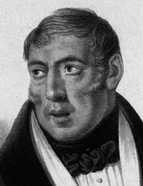

In the first years of parliamentary life after the Liberal Revolution of 24 August 1820, politician and academic Francisco Manuel Trigoso de Aragão Morato – one of the upmost personalities of conservative liberalism – stood out for his intelligence and sublime oratory. Despite his busy public life, he proved to be a passionate researcher of history, more specifically the history of medieval law, and showed a solid knowledge of the historiographical trends in vogue. He wrote numerous books of historical and legal nature that were considered works of high quality, and was one of the most pertinent political thinkers of his time. The son of Francisco Mendo Trigoso Pereira Homem de Magalhães and Antónia Joaquina Teresa de Sousa Morato, his education was initially directed towards an ecclesiastical career. Between 1790 and 1793, he began his preparation studies at the Colégio dos Nobres [Noblemen College] in Lisbon and entered the University of Coimbra, finishing his doctorate in Canon Law (1799) when he was only 22. With clear signs of being an exceptional student, he began his academic career as a lecturer in "Canonical Institutions" at the University.
A few years later he was appointed Commissioner of Schools and Studies for the Corte e Província da Estremadura [Court and Province of Estremadura] (1806), distancing himself completely from any collaboration with the French invader. He played an active role in the reform and standardisation of weights and measures in Portugal by becoming a member of a commission appointed by the Regency to examine the old charters (1810) under the responsibility of the Academia Real das Ciências de Lisboa [Royal Academy of Sciences in Lisbon], of which he was elected vice-secretary (1812) and later became a full member (1814).
This work is financed by national funds through FCT - Foundation for Science and Technology, I.P, in the scope of the projects UIDB/04311/2020 and UIDP/04311/2020.
